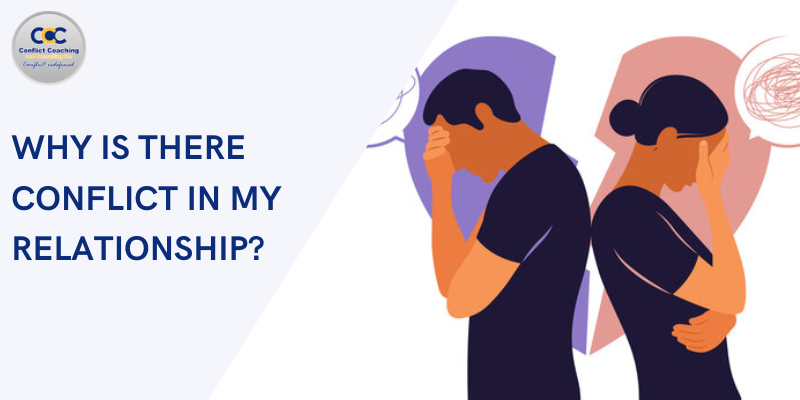Why Is There Conflict in My Relationship?

|
Getting your Trinity Audio player ready...
|
If you’ve ever asked yourself, “Why is there conflict in my relationship?”, you’re not alone. Even the healthiest couples experience tension. Conflict in relationships is not always a sign of failure; it can also be an opportunity for growth if handled well.
Dr. Carlos Todd, an anger and conflict management expert, explains that conflict is a regular part of love.
“Deal with the issues, but don’t let the issues be all you think about,” he says.
This balance is at the heart of learning how to handle disagreements constructively.
In this guide, we’ll explore why conflict arises, what types of conflict can appear in love, how much conflict is normal, and strategies to reduce unhealthy patterns.
Why Is There Conflict in My Relationship?
At its core, conflict comes from differences – differences in personality, needs, values, stress levels, and communication styles. When those differences clash, arguments surface.

Some common reasons couples face conflict include:
- Money stress: disagreements over budgeting, saving, or spending.
- Parenting differences: clashing approaches to discipline or values.
- Intimacy issues: mismatched desires or unmet needs.
- Work stress spillover: long hours and exhaustion leave little energy for connection.
These don’t always mean your relationship is broken. But ignoring them can lead to unhealthy conflict in relationships, where minor issues spiral into resentment.
The Hyperfocus Trap: Why Conflict Feels Bigger Than It Is
Dr. Todd points out a common mistake:
“People can develop a hyperfocus on the conflict, that’s all they think about.”
When you focus solely on the problem, the relationship starts to feel like nothing but tension. This negative lens creates a cloud over everything else, even moments of love and connection.
The healthier approach is to address issues, but not let them define the entire relationship. Balance matters: talk about problems, but also cultivate joy and appreciation.
Managing Stress to Reduce Conflict
Work and life stress fuel many relationship struggles. Dr. Todd shares that when he asks couples about their schedules, many admit to working 50–60 hours a week. This leaves little time or energy for meaningful connection.
Chronic stress increases irritability, lowers patience, and makes communication more challenging. According to the American Psychological Association, 27% of adults say stress regularly causes them to fight with a loved one.
To break the cycle:
- Prioritize rest and sleep.
- Exercise to release tension.
- Laugh more often; humour softens challenging moments.
- Create hobbies outside of work to recharge emotionally.
Managing stress doesn’t just make you calmer; it makes conflict more straightforward to navigate.
How Much Conflict Do You Think Is Normal in a Relationship?

Many people wonder, “how much conflict do you think is normal in a relationship?” The truth is, some conflict is inevitable. Experts suggest that occasional disagreements are healthy because they reflect honesty and openness.
The key difference is whether the conflict leads to repair and understanding, or to distance and hurt. Conflict becomes harmful when it turns into constant criticism, contempt, stonewalling, or silence.
In other words, conflict is harmful to a relationship only when it stays unresolved or becomes the dominant pattern.
Constructive vs. Destructive Conflict
| Conflict Type | Description | Impact |
|---|---|---|
| Constructive | Arguments where partners listen, compromise, and repair | Builds trust and intimacy |
| Destructive | Silent treatment, yelling, personal attacks, avoidance | Creates resentment and distance |
Knowing the difference helps answer: “Why is there conflict in my relationship?” Sometimes conflict isn’t the issue — it’s how it’s handled.
How to Improve Communication
Healthy communication reduces conflict dramatically. Try these strategies:
- Use “I” statements: “I feel unheard when…”
- Practice active listening by repeating back what you’ve heard before responding.
- Choose the right time: don’t start big conversations when stressed or tired.
- Focus on one issue instead of piling on grievances.
Rituals That Protect Against Constant Fighting
One powerful tip from Dr. Todd is to develop rituals of connection. He says, “
Develop rituals in your relationships, some small thing that both of you can look forward to so that you can connect with one another.”
Examples include:
- Hugging every morning before leaving the house.
- Sharing one gratitude before bed.
- Weekly date nights, even at home.
- A daily check-in ritual after work.
These rituals build trust, emotional intimacy, and a sense of safety. They act as a defence against conflicts taking over the entire relationship.
Managing Stress to Reduce Conflict
Stress is often the hidden answer to “why is there conflict in my relationship?”. External pressures like work deadlines or caregiving duties spill into interactions. Managing stress with exercise, meditation, and planned downtime keeps small irritations from turning into arguments.
Signs of Unhealthy Conflict
Watch for patterns like:
- Silent treatment
- Constant personal attacks
- Avoiding important discussions
- Fear of bringing up issues
These red flags suggest conflict may be harming the relationship instead of strengthening it.
Conflict and Finances
Money is one of the most common triggers of conflict. To reduce tension:
- Create a shared budget and review it monthly.
- Agree on spending limits for discretionary purchases.
- Be transparent about debts or financial goals.
- Consider working with a financial counselor if money stress continues.
Learn Conflict Resolution Skills
Many couples fight not because the issues are impossible, but because they lack the skills to handle them.
Skills that reduce conflict include:
- Body language awareness: staying open instead of defensive.
- Tone of voice: using calm tones even when disagreeing.
- Active listening: clarifying what you hear instead of assuming.
- Timing: choosing the right moment, not mid-stress.
If you’ve wondered, “what types of conflict can arise when people are in love?”, know that most conflicts fall into predictable categories like finances, parenting, intimacy, or household responsibilities. Skills give you tools to manage any of these without escalating into hurtful patterns.
In fact, research shows that couples who learn structured communication skills through therapy improve their relationship satisfaction by up to 70%.
What if My Partner Avoids Conflict Resolution?
Sometimes one partner refuses to engage in resolving the conflict. If this happens:
- Focus on calm, consistent invitations to talk.
- Avoid ultimatums unless safety is involved.
- Suggest couples therapy as a neutral space.
- If refusal persists, consider whether the relationship meets your needs long-term.
When Conflict Becomes Unhealthy

Conflict turns unhealthy when it is constant, unresolved, or filled with contempt. Signs of unhealthy conflict in relationships include:
- Frequent silent treatment.
- Personal attacks instead of issue-focused conversations.
- Feeling more like opponents than partners.
- Regular avoidance of important issues.
This is where resources can help. Programs like Fight Less and Love More, or taking marriage classes with your spouse, provide step-by-step strategies for rebuilding trust and cooperation.
Courses and Tools to Help Couples
Sometimes couples need more structured support to change patterns. Options include:
- Love and Trauma Course: helpful when past wounds shape present conflict.
- Fight Less and Love More: focuses on practical steps to reduce arguments.
Self-guided tools, such as conflict resolution workbooks or private coaching, also help couples practice skills in real life.
FAQs
1. Why is there conflict in my relationship even when we love each other?
Because love doesn’t erase differences in personality, values, or stress, conflict is natural, but it can be managed.
2. How much conflict is normal in a relationship?
Occasional disagreements are normal. What matters is resolving them respectfully and not letting conflict dominate.
3. What types of conflict can arise when people are in love?
Common conflicts involve money, intimacy, parenting, household tasks, and communication styles.
4. When does conflict become harmful to a relationship?
Conflict is harmful when it involves constant criticism, contempt, avoidance, or unresolved issues that create distance.
5. What resources help couples fight less?
Courses like Fight Less and Love More, marriage classes, and conflict resolution tools can make a big difference.
Conclusion:
Asking, “Why is there conflict in my relationship?” is a sign you care about making things better. Conflict is inevitable in love, but it doesn’t have to be destructive.
To recap Dr. Todd’s four core tips:
- Don’t hyperfocus on problems; balance them with positives.
- Manage stress to avoid unnecessary tension.
- Create rituals of connection to strengthen your bond.
- Learn conflict resolution skills to navigate differences.
A conflict style quiz can also help you identify how you and your partner handle disagreements, providing insights to improve your communication. With patience, tools, and sometimes professional guidance, couples can move from conflict to connection.
References
- American Psychological Association. (2010, February). Love, relationships and stress. https://www.apa.org/news/press/releases/stress/2010/love-relationships APA+1
- American Association for Marriage and Family Therapy. (n.d.). Couples therapy. https://www.aamft.org/Consumer_Updates/Couples_Therapy.aspx

